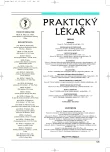-
Medical journals
- Career
Prevention of stenoses following ingestion of caustic substances is not an indication for corticosteroids.
Authors: D. Pelclová 1; T. Navrátil 1,2
Authors‘ workplace: Toxikologické informační středisko, Klinika nemocí z povolání 1. LF UK a VFN Praha, přednosta prof. MUDr. Daniela Pelclová, CSc. 2Fyzikální ústav J. Heyrovského, ČSAV Praha 1
Published in: Prakt. Lék. 2006; 86(3): 130-132
Category: Various Specialization
Overview
Afrequent complication on ingestion of acids or lye is the formation of esophageal strictures. There are conflicting views on the administration of corticosteroids for their prevention. Therefore the aim of the present
study was to compare present-day data in the literature and to assess corticosteroid therapy. Articles dealing with corrosive injury to the esophagus over the years 1991 – 2003 were researched on Medline and Scirus. The criterion for inclusion in the study was an endoscopically documented 2nd or 3rd degree of esophageal injury and at least 8-day therapy with corticosteroids or without corticosteroids. The data have been evaluated by the Pearson chi-square test at the 0.01 level of significance. There have been found six studies including 211 patients, of which four studies included the application of corticosteroids and two treated the patients without corticosteroids. Esophageal stenosis in 2nd degree injury was found in 15.4% of cases under corticosteroid therapy and in 6.3% of cases treated without corticosteroids, the difference not being statistically significant. In studies dealing with 3rd degree injury the incidence of strictures was significantly higher, namely 92.3%, in studies without corticosteroid therapy was only 23.1%.
A summary of the results of three overview studies in the years 1990 – 2004 including 505 patients only confirmed the following conclusion:
The analysis of studies has not demonstrated any favorable effect of corticosteroid therapy in 2nd and 3rd degree corrosive lesions of the esophagus. In 3rd degree injuries the results were even worse significantly. Corticosteroid therapy is not indicated in corrosive esophageal injury; even the worsening of healing and an increase in the number of esophageal strictures cannot be ruled out.Key words:
corrosives – corticosteroids – esophagus – strictures
Labels
General practitioner for children and adolescents General practitioner for adults
Article was published inGeneral Practitioner

2006 Issue 3-
All articles in this issue
- Search at the locale of a criminal act following a gunshot injury – procedure of the medical examiner.
- Frequent consulters of health care.
- Prevention of stenoses following ingestion of caustic substances is not an indication for corticosteroids.
- Congenital syphilis again on the scene worldwide. I. The epidemiology and diagnostics of syphilis – namely in pregnant women and in children.
- Topical situation in use of addictive substances in CR and foundation of the new discipline of addictology.
- Suicide as a result of benzodiazepine dependence
- The Heidelberg retina tomography II (HRT II) in glaucoma diagnostics.
- Responsiveness in medical practice: An evaluation of healthcare services in Boskovice.
- Acute rhino-sinusitis at the GP’s office.
- Levels of education and manners in students at exams in medical microbiology
- Psychological determinants of condom use
- General Practitioner
- Journal archive
- Current issue
- Online only
- About the journal
Most read in this issue- Suicide as a result of benzodiazepine dependence
- Acute rhino-sinusitis at the GP’s office.
- Congenital syphilis again on the scene worldwide. I. The epidemiology and diagnostics of syphilis – namely in pregnant women and in children.
- The Heidelberg retina tomography II (HRT II) in glaucoma diagnostics.
Login#ADS_BOTTOM_SCRIPTS#Forgotten passwordEnter the email address that you registered with. We will send you instructions on how to set a new password.
- Career

